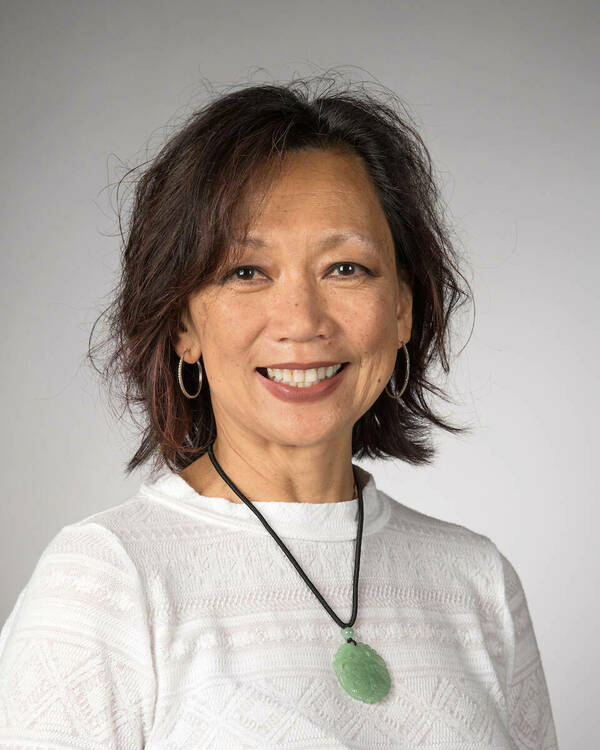October 18 is International Pronouns Day. The annual recognition seeks to make respecting, sharing, and educating about personal pronouns commonplace. Learn more.

While some may find it new and unfamiliar to proactively share their pronouns, it’s something Cecilia Lucero has practiced for at least four years. Words matter, and so do actions.
Sharing pronouns is a way of letting others know how to refer to you in the third person, without relying on assumptions based on one’s appearance, name or behavior. “Since some pronouns are gendered (“she/her” and “he/him”),” the Human Rights Campaign notes, “it is important to be intentional about the way we use pronouns as we all work to create as inclusive an environment as possible.”
Lucero, director of the Balfour-Hesburgh Scholars Program and a coordinator in the Center for University Advising, says being open about her pronouns creates a space in which others feel comfortable sharing their own. One way she does this is on her email signature. It reads, “My pronouns: She, her, hers.”
Her signature also includes a link to pronouns.org so that people can take the additional step of educating themselves on the topic if needed. The site provides background on the topic of pronouns as well as helpful resources.
“I’m on a rowing team of alumni women from Notre Dame, and one of them said to me a few years ago that she appreciates the link because she has a nonbinary child and she clicked on that link and learned a little more about why pronouns are so important,” Lucero said. “It’s a way to inform people without lecturing them.”
The students Lucero works with seem to have little problem adjusting to using someone’s pronouns, but she can relate to anyone who makes mistakes along the way. It’s important, however, to remain committed and to avoid intentionally calling someone by the incorrect pronoun. “I’ve been trying hard, but sometimes I screw up. I was an English major so ‘they/them’ threw me off," she admits. “But I think it’s very important to respect people’s wishes for how they want to be identified.”
It’s no different than showing someone the respect of learning how to pronounce their name, she said – a pain point Lucero is all too familiar with growing up as an immigrant in the United States. People would routinely mispronounce her name and her parents’ names. It was embarrassing for her dad, who wanted more than anything to fit into his new country. But for Lucero, making sure that people say her name properly is an important part of being respected in her identity.
"I think it’s very important to respect people’s wishes for how they want to be identified."
Ironically, Lucero’s parents grew up speaking the Filipino language of Tagalog, a language that only uses non-gendered pronouns. Despite becoming fluent in English, they always had difficulty applying ‘she’ and ‘he’ pronouns. It’s something that resonated with Lucero in her youth as well. “I’ve always been conscientious of [gendered language] because, even growing up, I didn’t like using the universal ‘he’ or ‘him’ or even using ‘mankind.’
“It’s not like this new thing,” Lucero said of the shift to a more inclusive way of speaking. “There’s different cultures that don’t use gender-specific pronouns.”
Beyond being intentional in the words she uses, she displays a variety of posters on the walls of her office that show an appreciation for diversity and an environment of welcoming. She also serves as an advisor to Show Some Skin, a student-led initiative that invites members of the Notre Dame community to share narratives about identity and difference, and as an affiliated faculty member with the Initiative on Race and Resilience. Students of color, nonbinary students and transgender students often seek her out to talk about their experiences and issues of concern.
As the co-parent of a non-binary stepchild, Lucero knows how important it is for young people who might be struggling to fit in for one reason or another to have a trusted adult they can turn to. And it doesn’t require huge gestures or leading large efforts to make a difference.
“I think having big initiatives can be a little overwhelming but I can alert people to ways they can help in small ways and signal to students that I’m somebody they can come to if they need an ally,” she said.